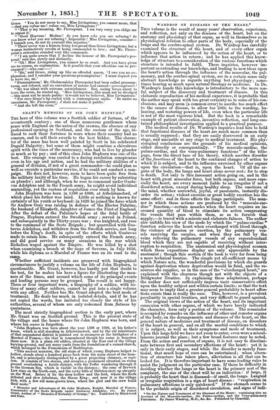GHA.NT'S MEMOIRS OF SIR JOHN HEPBURN. * THE hero of this
volume was a Scottish soldier of fortune, of the seventeenth century; one of those numerous gentlemen whom peace with England on the union of the crowns, the absence of any professional opening in Scotland, and the custom of the age, in- duced to seek their fortunes in wars where their country had no concern, and to sell their swords to the best bidder. The charac- ter of the mass has been well painted by Scott in his celebrated Dugald DalgettY ; but some of them might combine a chivalrous spirit with the vices of the mercenary, who had to live by plunder as much as by pay ; and of-this class John Hepburn was one of the best. His courage was carried to a daring resolution conspicuous even in his age and nation, and he had the military abilities of a general of division, if not of a great commander—he could plan as well as execute a particular service, if he could not conduct a cam- paign. He dOes not, however, seem to have been quite free from the military laxity of his time. He began his career by subsisting on plunder ; and although, when he rose to command under Gusta- vus Adolphus and in the French army, he might avoid individual marauding, yet the custom of requisition ever stuck by him. John Hepburn was born in 1598 or 1600, at Athelstaneford, of which place his father was laird. Little or nothing is known for certainty of his youth or boyhood: in 1620 he joined the force which Sir Andrew Gray was raising in defence of the Elector Palatine, the husband of Rlizabeth, daughter of James the First of England. After the defeat of the Palatine's hopes at the fatal battle of Prague, Hepburn entered the Swedish army ; served in Poland, and subsequently in the Thirty-years war ; was knighted, and rose to the command of the Scots Brigade ; but quarrelled with Gus- tavus Adolphus, and withdrew from the Swedish service, not long before the King's death, in spite of the efforts which Gustav-us made to retain him. He subsequently entered the French army, and did good service on many occasions in the war which Richelieu waged against the Empire. He was killed by a shot when examining a breach at the siege of Saverne, in July 1636, while his diploma as a Marshal of France was on its road to the caligiether sufficient incidents are preserved with biographical circumstances to justify a volume on the life of John Hepburn, is questionable. Mr. Grant, however, has hardly put that doubt to the test, for he makes his hero a figure for illustrating the man- ners of the times, and around which some of its principal events and leading persons may be grouped. The result is not happy. Three or four important wars, a biography of a soldier, with no- tices of many other soldiers, cannot be put into a single volume with any effect. Neither has Mr. Grant adopted the best mode of treatment. He deals too much in isolated details, and if he has not copied the words, has imitated too closely the style of his authorities, several of whom are only redeemed from flatness by quaintness.
The most strictly biographical section is the early part, where Mr. Grant was on Scottish ground. This is the present state of the village and the house where Sir John Hepburn was born, and where his name is forgotten. "John Hepburn was born about the year 1598 or 1600, at his father's house, which is still standing in Athelstaneford, and by the old inhabitants of that sequestered district is pointed out to strangers as the birthplace of a Marshal of France,—for that is remembered though his name is forgotten there now. It is a plain old edifice, situated at the East end of the village burying-ground, and not many yards from the foundation of a ruined church, which belonged to the Franciscans of Haddington. "This ancient mansion, the old steps of which young Hepburn helped to hollow, stands about a hundred paces back from the main street of the ham- let, and is principally distinguished by a great projecting chimney, or ing/e /urn. It consists of two stories, and occupies a prominent situation on rising ground overlooking a fertile district, with the Peffer wandering through it to the German Sea, which is visible in the distance ; the cone of Berwick Law rises on the North-east, and the rocky hills of Dirleton start up abruptly on the West. Before it lie the deep hollow and the ford, where the Scots defeated and slew Athelstan, the Saxon King ; and near it is the village kirk, with a few old moss-grown trees, where the Bled and the crow build their nests."
• Memoirs and Adventures of Sir John Hepburn, Knight, Marshal of France, Commander of the Scots Brigade under Gustavus Adolphus, etc. By James Grant, Author of " Memoirs of Kirks-My of Grange," &c. Published by Blackwood and Sons.


























 Previous page
Previous page